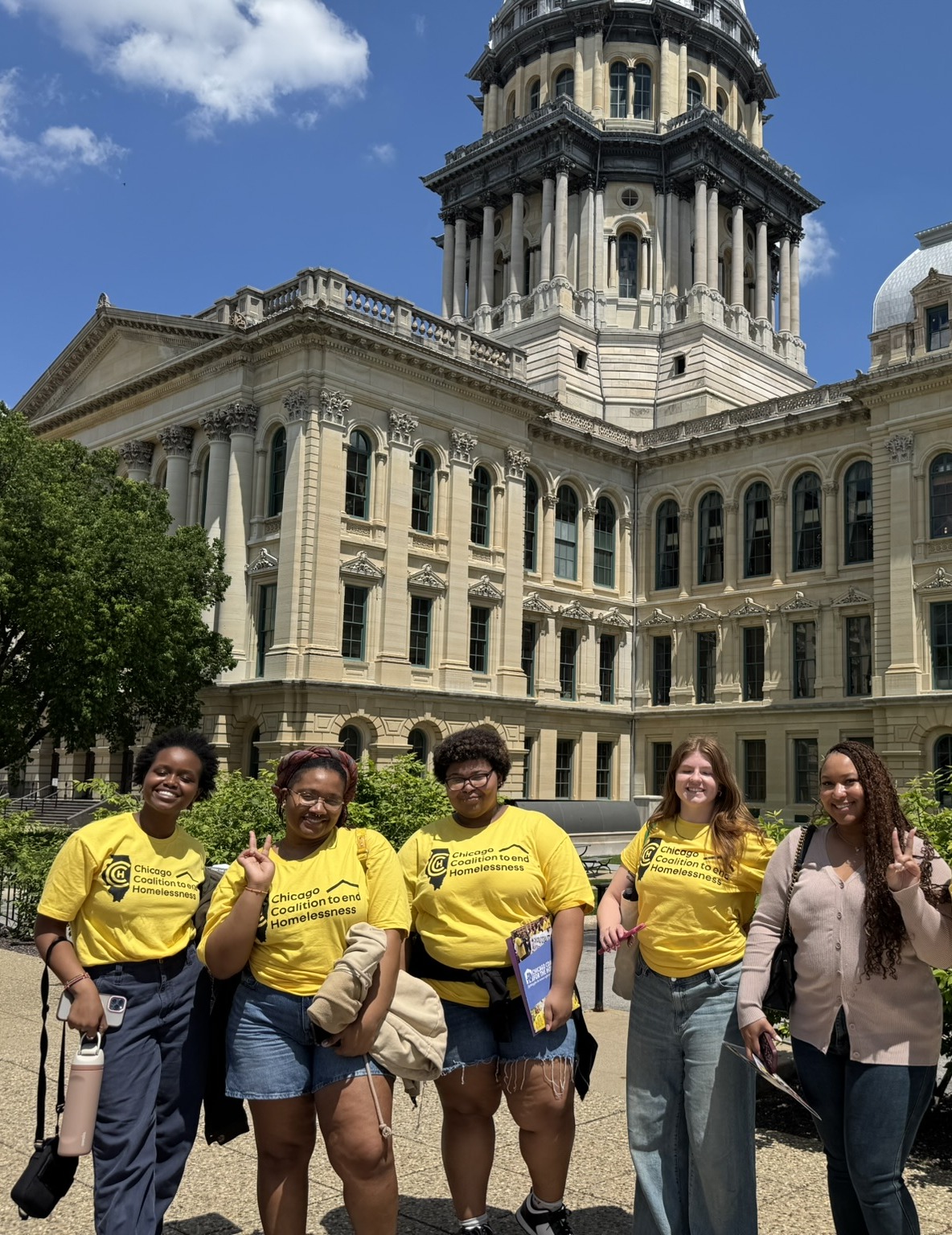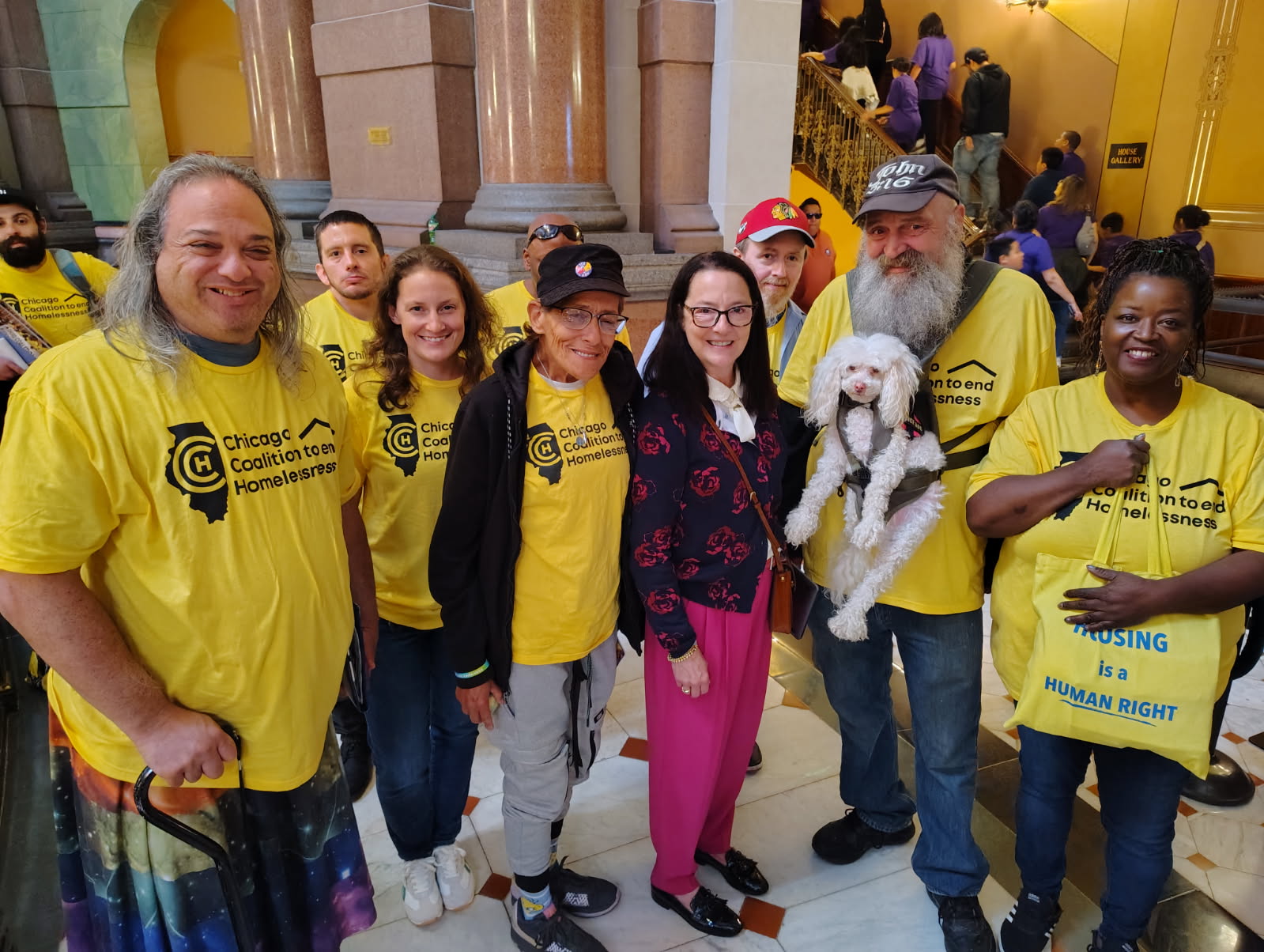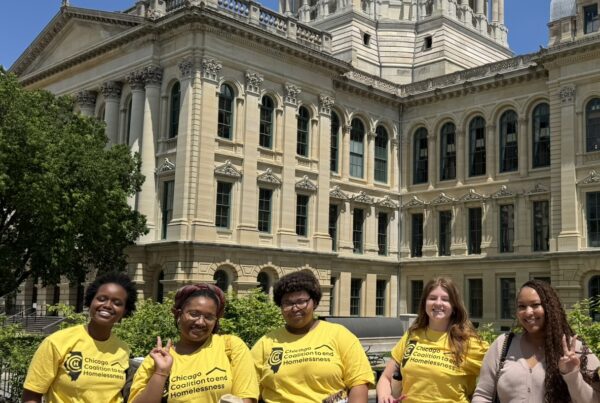By Niya Kelly, Director of State Legislative Policy, Equity, and Transformation
This year, staff, grassroots leaders, and partners from the Chicago Coalition to End Homelessness (CCH) advocated for several statewide measures that would help remove barriers for people experiencing and at risk of homelessness.
The Illinois General Assembly wrapped up its spring legislative session last weekend in Springfield, and CCH is celebrating victories resulting from advocacy by our Policy, Law Project, and Organizing staff, alongside our grassroots leaders. Legislation backed by CCH this session will impact families and children experiencing homelessness and housing instability—including students and survivors of domestic violence—and will better equip service providers to address homelessness through increased resources.
CCH hosted eight Lobby Days this session, traveling to Springfield with grassroots leaders, youth advocates, high school students and teachers, and the Homeless Prevention Coalition, a statewide coalition of homeless service providers and Continuum of Care (CoC) staff. These trips created opportunities for people to speak directly with their representatives, share their personal stories, and ask them to support both CCH’s substantive legislation and important funding in next year’s state budget.
In response to CCH action alerts, supporters from across the state asked legislators to move our legislative agenda forward through more than 1,250 witness slips, emails, and phone calls.


New Legislation to support Students Experiencing Homelessness and Domestic Violence Survivors
The following bills were passed unanimously in both chambers of the General Assembly and will be sent to Governor Pritzker for his signature:
Survivor Pathways to Independence (Included in HB 1075, Public Act 104-0002)
Sponsors: Representative Lilian Jimenez and Senator Mary Edly-Allen
CCH partnered with The Network Against Domestic Violence on legislation that supports domestic violence survivors in applying for Temporary Assistance for Needy Families (TANF).
Illinois, like other states, has a ‘Family Violence Exclusion’ that allows survivors to opt out of some of TANF’s stringent requirements—such as the 30 hour-per-week work, training, or education mandate and child support enforcement—that may make it more difficult for survivors to escape an abusive situation or put them and their children at risk. However, only 4% of TANF recipients who are survivors have been granted this waiver.
Currently, survivors must provide outside documentation—such as a police report, medical record, or a statement from a community member—and go through multiple interviews to qualify. This legislation, modeled after Pennsylvania’s process, would streamline access by sharing waiver information with survivors, allowing them to self-attest to their experience, and improve access to domestic violence support services. Simplifying the waiver process will increase safety and financial security for survivors ready to escape their abusers.
“I was proud to partner with the Chicago Coalition to End Homelessness and The Network Advocating Against Domestic Violence on this common-sense legislation that helps survivors and streamlines crisis assistance within the TANF application process,” said Sen. Mary Edly-Allen (D-Libertyville). “The proposed waiver and critical assistance funding are crucial tools for survivors. Now more than ever we need to continue to make resources readily known and accessible for our most vulnerable communities.”
Transparency in Title I Funding (HB 3377)
Sponsors: Representative Nicole La Ha and Senator John Curran
School districts receive federal Title I funds to support at-risk students—including homeless students—to ensure all children have access to a fair, equitable, and high-quality education. Unfortunately, some school districts allocate as little as $0.33 per student to address the needs of students experiencing homelessness.
This legislation would make Title I funding data publicly available, helping advocates better understand the scope of the need and availability of funds. This increased transparency would also allow districts to make more informed decisions to more effectively allocate resources to support homeless students.
“No child should be forgotten simply because they don’t have a permanent place to call home,” said House sponsor Rep. Nicole La Ha (R-Homer Glen). “Homeless students deserve results. HB 3377 demands transparency, tracks every dollar, and makes sure the help promised is the help delivered. It’s a huge win for kids who’ve been overlooked for too long.”
Continued Advocacy Next Session
The following bills did not clear the legislative hurdles necessary this year, but we will continue our advocacy next year.
Community Safety Through Stable Homes Act (SB 2264)
Sponsor: Sen. Karina Villa
Municipalities throughout Illinois have enacted so-called “crime-free housing and nuisance property” ordinances (CFNOs) under the guise of fighting crime and keeping communities safer by allowing the police and landlords to evict tenants who are accused of breaking the law. However, in practice, CFNOs establish a system that forces housing providers to unfairly penalize and sometimes even evict tenants based on any alleged criminal or nuisance activity—no matter how minor—pushing families into instability and even homelessness, ultimately undermining public safety.
CFNOs frequently exclude people of color from housing and endanger our community’s most vulnerable members. This includes survivors of domestic violence and people with disabilities, whose calls for emergency services or the police have led to eviction rather than the assistance needed. These ordinances often violate fair housing and other civil rights laws.
The Community Safety Through Stable Homes Act would help protect people from unfair discrimination, keep families in their homes, and encourage more effective responses to criminal activity in local communities.
Decriminalization of Homelessness (HB 1429)
Sponsor: Representative Kevin Olickal
In response to the U.S. Supreme Court’s Grants Pass v. Johnson decision allowing local governments to criminalize homelessness, CCH is partnering with Housing Action Illinois and other advocates on legislation to prohibit municipalities from passing unjust and counterproductive ordinances directing local law enforcement to arrest or ticket individuals who are experiencing homelessness.
Illinois ranks second in the nation after California in the number of municipalities adopting these ordinances, in some cases before homelessness has even become an issue in their community. These ordinances do not provide a solution to homelessness and only cause further harm to people experiencing homelessness and the providers who serve them. Imposing fines and arrests can have devastating consequences for individuals’ future access to employment and housing. Local governments should focus on constructive solutions to ending homelessness, rather than exacerbating the challenges that poverty and homelessness already create.
State Budget
This was a tough budget year. CCH advocated for small increases to the housing-related line items to ensure adequate resources for homeless service providers to address homelessness across the state. Unfortunately, the final budget includes a $21.3 million cut to homeless services funding. This is particularly concerning as we’re seeing compounding threats to homelessness and housing services coming from the federal government, and homelessness continues to increase due to the skyrocketing cost of housing and other necessities. Our advocacy continues!






